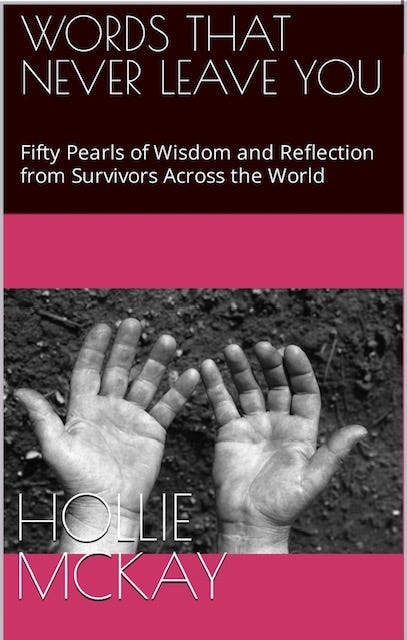Words that Never Leave You: “I do not want people to give me food. By God, we cannot eat the food someone else buys.”
Part Twenty-Five in an ongoing series from Hollie's book "Words That Never Leave You: Fifty Pearls of Wisdom and Reflection from Survivors Across the World."
It is the sort of tragedy that is hard to wrap one’s head around: at least fifty thousand people are dead, thousands more are unaccounted for, and millions are homeless in the throes of a frozen winter. In just a matter of minutes, two mammoth earthquakes – 7.8 and 7.5, respectively – razed cities, towns and villages in Turkey and Syria to the ground. Humanitarian experts now consider the wrath the worst natural disaster to rock the already poverty-stricken and war-plagued region in over a century.
Statistics and endless images of upturned earth and broken bodies desensitize us. But we must remember that numbers have names, and names have faces.
“My house is destroyed, and everything in it,” a Syrian friend, a young man named Mouhannad in his early thirties, told me. “I don’t know what kind of life I am living.”
I first met then twenty-something Mouhannad amid the darkest days of the Syrian war more than seven years ago. He was studying to be a veterinarian at Al-Baath University when war ravaged his homeland, and he left to volunteer for many humanitarian organizations. However, when bombs rained on his humble home, Mouhannad fled north with his family and into Turkey’s south.
Mouhannad recalled weeping in the frost until first light, as buildings came crashing down as he prayed, praying for the friends he knew living in those decimated abodes. Finally, at sunrise, he found a truck his family could shelter inside, as he returned to his fractured residence to find blankets and identification papers. Everything else, including his motorbike, was ruined beyond recognition. Mouhannad discovered his friend’s daughter screaming hysterically in the streets, begging for someone – anyone – to help get her family out of the rubble.

Nevertheless, I still cannot imagine the gut-wrenching horror of losing everything you had known and loved not once – but four times as in Mouhannad’s case – and having the strength and resilience to pick yourself up and do it all over again. Yet, for many Syrians, there is no time for victimhood. Almost everyone is worse off than you, and complaining makes no sense.
I offered to send Mouhannad and his family money, which he immediately refused.
“I am looking for a job now, even if it is outside Turkey. But unfortunately, I can’t take money. I must work to settle into a house with my family. I don’t know what is next and where I can start a new life with a good job,” he said, cracking with emotion.
I asked if the food at the overstuffed shelter is adequate.
“I do not want people to give me food,” Mouhannad stressed, stoically holding himself together. “By God, we cannot eat the food someone else buys.”
It is easy for us in our faraway cocoons to forget that refugees and the displaced do not want handouts. They want to feed their families and survive and do so on their terms.
PURCHASE YOUR COPY OF “WORDS THAT NEVER LEAVE YOU” TO READ MORE REFLECTIONS AND ANECDOTES
** Short read of meaningful lessons gleaned from the ordinary forced to become extraordinary
For speaking queries please contact meta@metaspeakers.org
I am also available for a select number of private coaching sessions for those wishing to write a book or venture into the foreign journalism space. Please contact directly for rates hollie@holliemckay.com
PLEASE CONSIDER A PAID SUBSCRIPTION TO THIS SUBSTACK TO KEEP INDEPENDENT JOURNALISM ALIVE.



